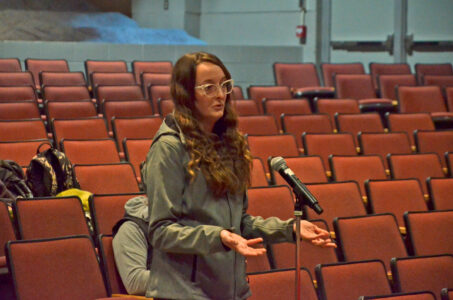Gillibrand pushes for $2.5M grant for Trudeau Institute
Senator says appropriation process uncertain this year, as public health research is defunded

Sen. Kirsten Gillibrand speaks at Trudeau Institute on Monday as she promotes a $2.5 million Senate appropriation she’s pushing for the infectious disease research facility to get. (Enterprise photo — Aaron Marbone)
SARANAC LAKE — Sen. Kirsten Gillibrand was at Trudeau Institute Monday to tout a $2.5 million appropriation she’s pushing for on the institute’s behalf. This comes at a time when she says the Donald Trump administration is “undermining” public health infrastructure.
The Saranac Lake-based private, independent nonprofit is one of just a few New York research facilities with Biosafety Level 3 capabilities. Gillibrand said it plays a key role in the domestic response to emerging and re-emerging bio-threats.
Trudeau Institute is one of the longest-running businesses in Saranac Lake and has provided decades of research for the scientific community on diseases like influenza, cancer, sepsis, Zika, COVID-19 and, to this day, tuberculosis.
The $2.5 million appropriation has been included in the Senate’s 2026 appropriations bill for Commerce, Justice, Science and Related Agencies. Gillibrand, who recently joined the appropriations committee, said this bill has passed out of committee, but the Senate still needs to pass the entire funding package and get it through the House.
North County Rep. Elise Stefanik also supported a $4.5 million appropriation for Trudeau Institute through the Community Project Fund, where Congress members can nominate projects in their district to receive federal funding. However, this appropriation did not go through because the House passed a continuing resolution, maintaining funding levels from the previous year. Trudeau Institute President and Director William Reiley said the institute has reapplied for this grant, which has been reduced to $4.2 million now.
He said Stefanik is adamant about supporting Trudeau Institute, adding that they need all their federal representatives to speak up and support a full National Institutes of Health budget.
Gillibrand’s grant, which was also supported by Sen. Chuck Schumer, is separate from Stefanik’s. The institute could get both.
“If the appropriations process works,” Gillibrand said to nervous laughter, “which, we don’t know if it will work.”
Normally, the House and Senate go into conference and agree on a final number before putting it on the floor, but she’s not sure if the administration will support that or not.
The Trump administration has cut hundreds of millions of dollars in NIH grants, slashed university funding and last week fired 600 employees from the Centers for Disease Control and Prevention as it seeks to reduce federal spending.
Gillibrand said she is pushing to restore NIH funding through the appropriations process.
Reiley said the institute has not seen direct losses because of these cuts, so far. He said there has been an indirect impact as some of the institute’s partners have lost funding. He said, every day, he worries about the institute losing funding.
Currently, 30% of the institute’s funding comes from the NIH.
Trudeau Institute has an annual budget of $9 million to $10 million. The budget will likely be lower this year, he said.
Gillibrand called the cuts “deeply troubling” and said it will have “decades-long ramifications” on Americans’ health. She was blunt when explaining why she believes the cuts are being made.
“They don’t feel it’s a priority and they would rather have tax cuts for people earning over $1 million,” Gillibrand said.
Trump’s budget is projected to add trillions of dollars to the national debt and meets Elon Musk’s goals of cutting federal workforce and budgets by 50%, she said, while offering “massive” tax cuts for “people who are all too wealthy.”
Earlier this year, the NIH lowered the amount of a grant that can go toward “indirect costs” to 15%. Before, the average indirect cost rate reported by NIH averaged between 27% and 28% over time.
Gillibrand called “indirect costs” a “misnomer.” Paying for electricity to operate laboratories is not indirect, she said, it directly impacts the ability to do research. She said the NIH needs to revamp its labeling of these costs.
Lawsuits have been filed to restore this NIH funding. Lower court judges ruled in support of restoring the funding, but these cases are currently being appealed. Gillibrand said it is illegal for Trump to subvert NIH grants after Congress approved them.
Reiley said, if approved, the appropriation funding would be used to purchase equipment to modernize research at the facility and bring it to the “next level.” He hopes to purchase a flow cytometry machine, which analyzes cells suspended in fluid using laser-based fluorescence detection, as well as equipment that allows researchers to track infection in animals over time while they are still alive.
He said this would be used to study the efficacy of new therapeutic drugs, vaccines and cancer medications, tracking drug levels and concentrations and seeing how things change over time. This is usually done postmortem, he said.
If a treatment is working in one animal but not another, they’d be able to better see why.
Gillibrand said Trudeau Institute does important work with global impacts.
“The institute works to support U.S. national security,” Reiley said.
They partner with the Walter Reed Army Institute of Research to evaluate therapeutics and vaccines developed there. These are given to soldiers to protect them when they are deployed in areas with high rates of disease.
The infectious disease landscape is “ever-changing,” he said. Recently, there are concerns of growing antimicrobial resistance amongst bacteria. Reiley said the field needs new antibiotics to combat this resistance.
Trudeau Institute currently has 64 employees, down from the 120 employees it had around 20 years ago. Reiley hopes to get employment up again.
Gillibrand said she plans to reintroduce her “One Health Security Act.”
“This bill would require the Office of Pandemic Preparedness and Response Policy (to) be continuously staffed under the leadership of a presidentially appointed director,” according to a press release. “The bill would also require the Office of Management and Budget to create a unified biodefense budget for all agencies to ensure adequate biodefense funding and coordination between agencies.”




